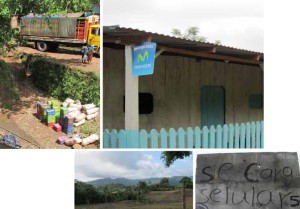Could the new technologies facilitate access to electricity? In Latin America and the Caribbean, there are around 31 million people without access to the commercial electricity grid. Of these, some 11 million subscribe to mobile telephony services. In other words, many Latin Americans have a telephone but no place to recharge it. What role could the mobile telephone industry play? Are there sustainable business models in all this?
In 2013, the Mobile Enabled Community Services Programme of the GSMA, the international association of mobile operators, with the support of the Multilateral Investment Fund (MIF) of the Group of the Inter-American Development Bank (IDB), decided to evaluate this matter in the aforementioned regions. The result of that initiative was the report entitled “Beyond coverage: the opportunity for mobile operators to improve access to energy in Latin America”, whose study case focuses on the Nicaraguan market, based on the Movistar network in that country.
How can mobile operators facilitate access to energy?
- The operators’ infrastructure or mobile telephony base stations: if the electricity grid is extended to these, electrical connection can be expanded to a concentrated core of adjacent buildings; or, if the station has its own, autonomous energy system (based on renewable or non-renewable energies), the surplus energy can be used to provide basic services for nearby communities.
- The mobile operator’s distribution channels, i.e. the stores and certain points of sale, can be taken advantage of to reach those who are most cut off people and to distribute energy, for example by means of the commercialisation of portable mobile chargers using solar energy.
- The technologies of payment via the mobile are leading to the appearance of new business models, known as “Pay As You Go”. This means that, for people on low incomes, access to energy is simpler as they can pay for it using services such as payment by SMS or mobile money.
The report reveals that the operators are focussing on the development of these mobile money platforms, as a way of providing consumers with advance payment solutions for the purchase of energy products and services, adapted to the amount of cash they have access to and their daily spending habits. This will help to reduce the high costs which families not connected to the grid are obliged to pay (kerosene, gasoil, batteries and payments to third parties).
Focussing on the study case in Nicaragua, its conclusions show that there is an opportunity for mobile operators to support access to energy services. 25% of the population does not have mobile coverage and 28% is not connected to the electricity grid, and it is estimated that a total of 1.45 million people do not have access to either the electricity grid or mobile coverage, which represents a significant opportunity for growth.
In this way, the mobile operators, including Telefónica could – says the GSMA – become an important agent in the access to electricity, the creation and development of new and innovative models of sustainable energy. Initiatives of this type will permit the operators to develop new business opportunities, take advantage of their infrastructure and, at the same time, resolve the energy needs of their customers through new Green services.
This study was promoted by Telefónica’s Climate Change and Energy Efficiency Office with the support of Movistar Nicaragua. You can download the report here: http://bit.ly/JYKJLQ
